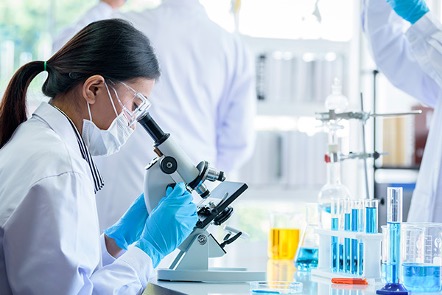
Sep 16, 2021
As part of its continous committment for the environment and in search of suitable soils for the cultivation of the best berries, the company has had for years a team of professionals that make up the laboratory of biological products that fulfill the fundamental function of protecting farms from pests, among other threats.
Contrary to what one might think, the agricultural world is extremely complex. Cultivation in open farms always requires a lot of care and various requirements such as water resources, suitable climatic conditions and of course, sunlight. An example of this complexity is what is observed every day in Hortifrut’s biological products laboratories, both in southern Chile (Los Angeles, Region VIII) and in northern Peru (Trujillo) where teams of specialists in each country are in charge of collecting soil samples from different farms to determine if they are suitable for certain crops, and also elaborate supplies of biological nature for agricultural use, as is the case of microorganisms that will help to carry out the sanitary control of the fields organically.
A few years ago, these microorganisms were purchased from external suppliers, but today they are produced within the same production location in a more efficient way and, more importantly, it allows to have real and accurate soil samples, avoiding making cultivation decisions based on assumptions. “This gives certainty that the results will be in accordance with the real conditions of each farm, without drawing conclusions or basing studies on frozen samples or other similar ones, for example,” explains Carlos Araujo, Head of Laboratory at Hortifrut Peru.

Among the main sanitary objectives that Hortifrut laboratories seek to meet, is to control diseases caused by microorganisms in the fruit, as well as to manage and avoid possible insect pests, thus reducing the eventual loss in the harvest. To achieve this, in each of these microbiology laboratories the samples are processed, the beneficial microorganisms extracted and stored, and then mass production begins and is applied to the cultures.
The work that is carried out based on these pathogens identifies beneficial microorganisms or controllers that will be generated in the laboratory to immunize fruits against fungi and thus not lose them, in addition to opening a range of controllers to find the most appropriate management of the different diseases they could face. “It is very important to emphasize that each investigation is carried out based on the soil of the farm to be cultivated, that is, we cannot send an investigation of Peruvian farms to Chile, because the conditions – climate, humidity, type of soil, among others – vary too much ”, clarifies Araujo.
In the same sense, Iván Paila, Head of Laboratory at Hortifrut Chile, points out that “to achieve a successful process we use an intra-farm management system that identifies, isolates, multiplies and returns beneficial microorganisms to the soil, allowing us to have up-to-date biological batteries for production management, extending technology to solve phytosanitary problems, using the tools from the same field”.
The process is preventive, because once installed in the farm, the controlling fungus will not leave space for the pathogen to lodge. If it happened the other way around, the fruit would be lost or it could be treated with chemical supplies that finally also contaminate the soil and the rest of the berries. As the expert explains, “one of the main reasons why we carry out this work is to avoid the use of toxic elements in the farms, attacking pathogenic fungi in a natural and biological way. There are many insecticides and pesticides on the market that can fulfill the function of eliminating pests, but they are toxic supplies that contaminante and do not contribute to the soils. Our method, on the other hand, contributes to the study of natural controllers for the elimination of pests, helping to maintain the environmental balance”, highlights Paila.
All the technological infrastructure such as flow chambers, incubators and microscopes, added to the staff of professionals specialized in microbiology, make Hortifrut laboratories a neat place for research and studies that contributes to continue producing in a sustainable way, taking care of the earth and our environment, and of course growing and harvesting the best berries to deliver all around the world, every day.